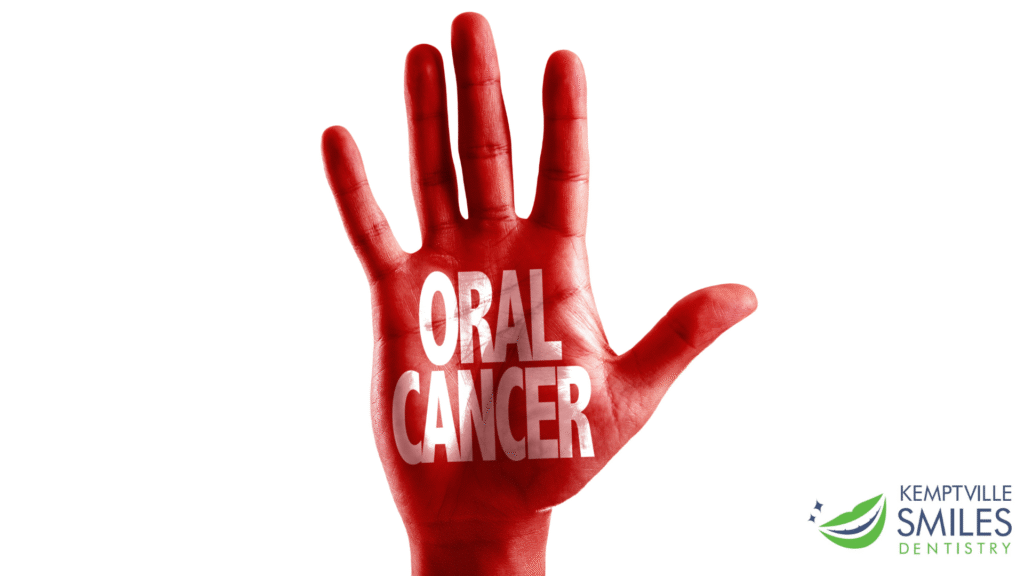How Does My Dentist Perform an Oral Cancer Screening

An oral cancer screening is a visual and physical examination of the gums, mouth, tongue, and other oral tissues to check for signs of cancer or precancerous conditions and find cancer before symptoms develop. This screening is typically performed by a dentist or other healthcare provider, and when they do detect oral cancer in its early stages, treatment may be more successful.
Learn about what to expect from an oral cancer screening and how to prepare for one.
Why Is Oral Cancer Screening Done?
Your doctor may recommend oral cancer screening to:
- Detect mouth cancer – An oral cancer screening can assist your dentist in detecting early-stage mouth cancer or precancerous lesions that may lead to mouth cancer. Early detection increases the chance of a successful treatment. Cancer or lesions at an early stage are easiest to remove and highly likely to be cured.
- Benefit people with a high risk of oral cancer – Common risk factors for oral cancer are exposure to human papillomavirus, heavy alcohol consumption, a family history of cancer, and tobacco use. If you have any of these risk factors, it is especially important to get regular cancer screenings.
Moreover, it is recommended that adults receive an oral cancer screening at least once a year and more often for people who are at a higher risk for oral cancer.
How Should You Get Ready for an Oral Cancer Screening?
Preparing for an oral cancer screening generally does not require any special steps, as it often takes place during a physical checkup or a routine dental visit. But here are a few things you can do to prepare:
- Brush and floss your teeth. It’s always best to brush and floss your teeth before an oral cancer screening. This will help ensure that your mouth is clean and free of debris, which will make it easier for your dentist to examine your oral tissues.
- Wear comfortable clothing. Keep in mind that you’ll be sitting in a dental chair, so wearing comfortable clothing can help you feel more at ease.
- Avoid smoking and using tobacco. If you smoke or use tobacco products, it’s a good idea to avoid them for at least an hour before the screening. This will help reduce irritation in the oral tissues and make it simpler for your dentist to identify any abnormalities.
- Be prepared to answer the dentist’s questions. Your dentist may ask you some questions about the symptoms you are experiencing as well as your medical history. Be sure to provide this information and answer the questions as honestly as possible.
For an oral cancer screening, you don’t need to do anything special or plan ahead. The most crucial thing to do is to show up on time for your appointment and cooperate with your dentist throughout the screening process. Here at Kemptville Smiles Dentistry, you may request an appointment to discuss your needs, and we will get you in as soon as possible.
What to Expect From an Oral Cancer Screening?
During an oral cancer screening, you can expect your dentist to examine your mouth and oral tissues to check for lumps or other abnormalities. Your dentist may likewise examine your throat and neck.
An oral screening usually takes less than five minutes and includes the following methods:
- Visual exam or inspection – Your dentist will visually inspect your mouth, gums, lips, tongue, and other oral tissues for any bumps, discolouration, lesions, lumps, and sores.
- Palpation – This is a physical examination where your dentist uses his/her hands to feel for any bumps or lumps in your mouth, jaw, or neck area. Be sure to inform your dentist if there are areas that are sore or tender.
- Fluorescent staining – Your dentist may use a special fluorescent dye to help identify any abnormal cells in your mouth.
Oral Cancer Screening in Kemptville, ON
Oral cancer screening is a non-invasive procedure that takes only a few minutes to complete. It is an essential part of preventive healthcare, and you should receive regular screenings, especially if you are at higher risk for oral cancer.
